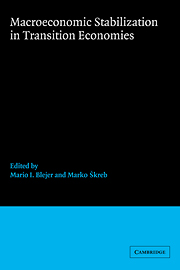Introduction Stabilization After Five Years of Reform: Issues and Experiences
Published online by Cambridge University Press: 09 October 2009
Summary
Stability is not everything, but without stability, everything is nothing.
Karl Schiller Former German Minister of the EconomyMore than any other single event, the fall of the Berlin Wall in November 1989 symbolized the beginning of the process of transformation of the economies of Central Europe and of the former Soviet Union from centrally planned, command systems to liberal, marketoriented economies. Although the “transition from socialism,” as this process of transformation has been labelled, is centered around fundamental economic changes, transition is a multifaceted phenomenon that encompasses complex structural, institutional, and behavioral adjustments that go well beyond the realm of economics. For many countries, the demise of socialism signaled not only the start of a period of economic modifications but indeed the beginning of their nation-building process.
The analysis of the nature and causes of these tumultuous events has challenged virtually all established modes of studying human relations, from the purely ideological to the highly technical. Although transition is not an exclusively economic phenomenon, economics has taken center stage in the study of the postsocialist transformation; a complete new branch of economics – the economics of transition – has developed, focused on explaining and providing advice concerning this unprecedented process. Moreover, a special international financial institution, the European Bank for Reconstruction and Development, has been created to support and enhance the transitional process.
- Type
- Chapter
- Information
- Macroeconomic Stabilization in Transition Economies , pp. 1 - 14Publisher: Cambridge University PressPrint publication year: 1997



